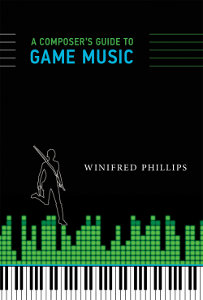Original Book Review by Alan Rogers
Music for video games has developed over the last 20 years or so as the technology behind the video games themselves has become more complex. Today, many video games contain orchestral scores and have much in common with film scores of the films coming out of Hollywood and beyond. Because of these similarities it’s easy to assume that the issues and challenges faced by the game and film (or TV) music composer are the same. Award-winning composer Winifred Phillips’ music first appeared in God of War in 2004 and she has gone on to compose music for games such as The Da Vinci Code, Shrek The Third, Spore Hero, LittleBigPlanet 2, Assassin’s Creed III: Liberation, and many others. In her new book, A Composer’s Guide To Game Music, Phillips expertly details what’s involved in becoming a video game music composer, highlighting the specific challenges a composer for games faces.. By the end of this excellent book, any reader contemplating a career as a video game music composer will understand clearly the personal and technical abilities required to succeed and anyone with a more general interest in video gaming or how music is used in film, television and video games will better appreciate how different composing music for video games is from any other media type. Continue reading “A Composer’s Guide To Game Music – Winifred Phillips”

